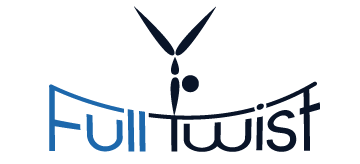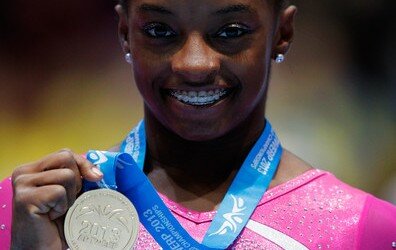Recently we were offered a rare opportunity to talk to 2013 World and USA All Around Champion Simone Biles.
In July 2013, Simone competed for the first time as a Senior in the Secret U.S. Classic where she performed poorly. Competing on three apparatus, she placed second to last in the All Around (AA) competition with a score of 41.33. A tough warm up meant that Biles scratched Vault from the competition, already scuppering her chance at a high ranking in the AA. Falls on Bars and Floor and a shakey Beam routine not only brought her score down, but also her confidence.
The 16-year-old’s confidence suffered greatly and her family and coaches decided to turn to sports psychology as a treatment in an effort to help her performance. After a couple of sessions with Robert B. Andrews of the Institute of Sports Psychology in her hometown of Houston, TX, she learned how to manage her nerves and use her excitement to improve her performance. This showed at the 2013 P & G Championships where she was crowned National Champion and thus secured her place on the National Team.
Just two months after the U.S. Classic, she competed at the 2013 World Gymnastics Championships in Antwerp, Belgium, and won the All Around title with a score of 60.216, ahead of three former World AA medallists.
Following on from winning her World AA title, Biles has gone from strength to strength. Despite being side lined with recent injury she has shown magnificent upgrades at the USA Training camps at the Karloyi Ranch, as well as being known to be working towards a triple twisting Yurchenko Vault.
Unfortunately Sports Psychology is a topic that is very seldom discussed openly, yet Biles credits psychology as one of the main elements of her training that boosted her confidence. For sports that are so mental in nature, like gymnastics, sports psychology aids in many aspects—from injury recovery to performance. We spoke to both Simone about her experience with Sports Psychology and to Robert about working with Simone and about Sports Psychology and how it relates to gymnastics.
FT: Simone, many gymnastics fans are unaware of your success with sports psychology. Can you tell us why you began to work with Robert B. Andrews, sports psychologist?
SB: We worked together after the Secret US Classic and before the World Championship to help build my confidence.
FT: What sort of issues were you having in the gym?
SB: The US Classic last year was not a great meet for me. After working with Robert, I was able to recover and get my confidence back to perform better at the US Championship (where I placed first). I had trouble focusing in certain events.
FT: Talk us through a typical session with Robert.
SB: Robert worked with me on pulling the throttle back, so I can be more calm and consistent in competition.
FT: What advice do you have for gymnasts who have are struggling with their own issues in the gym?
SB: I was very resistant to working with Robert in the first place. There was a negative stereotype, and I thought that people would think I was crazy. I would want people to know that seeing a sports psychology consultant doesn’t mean you’re crazy! There are always things you can work on to be more confident. I would recommend that gymnasts who are struggling to go see a sports psychology consultant – it helps! I believe that if you are in a good place mentally and emotionally, the confidence will come through.
FT: How do you get through a training day where nothing seems to click?
SB: One of the biggest things that helps me is remembering to have fun! When I’m smiling and having fun, I perform the best.
FT: What techniques have helped you to overcome your issues, in training, outside of the gym, and during competition?
SB: Finding ways to calm down was really important. I found that I was getting too intense. Working with Robert also helped ease my fears and I found more confidence.
Discussion with Robert B. Andrews regarding sports psychology, relating to Simone Biles and gymnastics.
FT: Many of our readers will not be too familiar with sports psychology. Can you explain what sports psychology consultants can help athletes with?
Sports psychology is a tool that athletes can use to improve their performance, reach a goal, or become more mentally tough and focused. Performance is the combination of talent and an athlete’s belief in that talent. Most athletes focus on their physical talent. Sports psychology addresses the mental and emotional component, the athlete’s belief in himself or herself, which strengthens performance as a whole.
Sports psychology can also make a huge impact in the injury recovery process. Sports-related injuries are not just physical in nature—mental and emotional components are also present. Returning to play without addressing the pain, suffering, loss, isolation, despair, disconnect from a team and competition, and other unprocessed neurological information can lead to anxiety, depression, doubt, fear of re-injury, and even new injuries.
With the advances in sports medicine today, surgery is more precise and effective. Because of this, athletes return to play faster, leaving less time for the brain and nervous system to process the mental and emotional impacts of the injury. Sports psychology focuses on treating these elements, so that when athletes return, they are truly able to perform at their highest level possible.
FT: Out of all Olympic sports, would it be true to say that gymnastics may be one of the top sports that requires mental toughness?
Absolutely. Most sports are mental in nature, but gymnastics does require a huge amount of mental toughness. It is imperative that gymnasts maintain composure and awareness of surroundings throughout competition, so that they are in the optimum space for performance the minute they enter the gymnasium.
FT: Did your work with Simone involve you being in the gym to work with her during practice when she would be struggling?
I worked with Simone in my office, but I’m always just a text or phone call away for all of my athletes. I also use Skype and FaceTime and have worked with athletes all over the world when they are competing internationally.
FT: How important is it for you to communicate with the coach, or is all of your focus on the gymnast?
It depends on the situation. In most cases, I don’t do a lot of interacting with the coach. It is good that the coach knows that the athlete is working with a sports psychology consultant. The athlete might be working on certain mental skills and might take a little longer to prepare for certain skills or exercises. This could be interpreted as balking or hesitation. I tell the athlete to let the coach know what mental skills they are working on, so we can all be on the same page.
If the coach can see me as a part of the athletes support system and we can all work together, then the process works very well.
I like an open relationship where the coach is open to any feedback that I can give them to help make their coaching style more effective.
FT: A lot of our readers are coaches, is there anything in particular that a coach can do when faced with the situation of working with a gymnast who is 100 percent capable of performing the skills required of her but who feels she “can’t”?
Many of the athletes I work with have found that strengthening the mental component of their routines through visualization techniques, breathing, mindfulness, and other exercises is very important.
FT: What advice do you have for gymnasts through a training day where nothing seems to click?
Gymnastics training can be a very up and down experience. The athlete has to understand that there will be highs and lows. The goal is to work on a continuing upward trend in their training and, ultimately, their competition. There is a lot to learn during workout where the gymnast is struggling. It is a good to work on the mental skills they are integrating into their training regimen. Bad days can be used to create mental toughness that shows up on the floor during competition.
FT: Can you give examples of emotional abuse that gymnasts may receive from coaches and how better we can construct our feedback?
There are so many stories about toxic coaching; social media has only brought these stories forward even more. I’ve worked with athletes (not just gymnasts) who have been mentally, emotionally and psychologically intimidated and abused by coaches.
Education is key to shifting this paradigm away from the authoritarian and abusive way of coaching toward a model of respect, compassion, learning life lessons, accountability, integrity, and consequences. Kids are different these days and the harsh treatment that might work for one will alienate others. Today’s athletes don’t tolerate being treated poorly. They don’t respond or play well under negative types of coaching. It is easier to build up a child than it is to repair an adult. Choose your words wisely.
Our sincere thanks to Simone Biles for being open to discuss her experience with Sports Psychology and to Robert B Andrews for his in depth knowledge. Special thanks must also go to Lindsay McClelland of MMI Agency for her work in putting this interview together. Please note that we are very respectful of the gymnasts privacy and the confidence struggle that she has over come, so have been careful to select questions which are suitable to publish without being invasive and that the gymnast was comfortable answering withuot giving away too much information in regards to her on-going experience with sports psychology.
Image Source: Dean Mouhtaropoulos/Getty Images Europe
















Great interview on a really interesting topic! I didn’t know Simone had been working so closely with a sport psychologist but the improvement has really shown. Just a quick correction: Simone’s first comp as a senior was American Cup, not Classics (although she had mistakes there too)